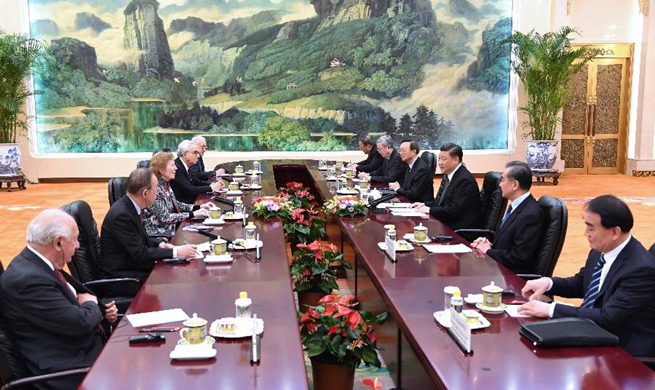LONDON, April 2 (Xinhua) -- Britain's governing Conservative would emerge as the largest party with a reduced majority in a snap general election, a leading academic politics expert said Tuesday.
But Professor John Curtice from Scotland's Strathclyde University said a Labour-led grand coalition of opposition MPs could gather enough seats to move into 10 Downing Street to govern the country.
Writing in the Daily Telegraph, Curtice said holding a general election could simply make Britain's Brexit impasse even more difficult to resolve.
His predictions came as Prime Minister Theresa May was locked in lengthy talks with her senior ministers at a Downing Street cabinet meeting.
Her ministers are divided between those wanting to leave with no deal and ministers who favour a softer Brexit to secure a deal with the European Union.
The meeting was called against a backdrop of MPs failing on Monday night to find majority support for any alternative Brexit deal proposals to the one May has put forward but had been rejected three times.
A snap general election is emerging as a growing possibility with Britain's Brexit journey deadlocked.
Curtice wrote that in a general election the Conservative could emerge with 300 of the 650 seats. Following resignations, the Conservatives now have 312 MPs, relying on support from 10 Democratic Unionist Party (DUP) MPs to give it a wafer-thin majority.
Curtice said even if the Conservatives and the DUP were to forge another deal, an agreement with the DUP could not take the Conservative Party over the line.
He said the current leading opposition Labour Party, with an expected 263 seats, would be much further away from having a majority.
"However, the (Labour) party might be able to form a government if it could secure the support of 48 Scottish Nationalist Party and Plaid Cymru (Party of Wales) MPs, as well as 20 Liberal Democrat MPs and one Green MP. Between them the four parties would have a narrow overall majority of 14," said Curtice.
The academic said he his prediction was based on a projection from the average of the most recent polls among leading poll companies.
"It is clear that the endless debate about Mrs May's (Brexit) deal has not done either the Conservatives or Labour any good among the electorate," noted Curtice.
He said support for the Conservatives has fallen by three points to 36 percent since the outcome of the Brexit negotiations was first unveiled in mid-November.
The Conservatives have lost ground primarily among Leave supporters. Among them its support has dropped by no less than six points, said Curtice, adding: "Doubtless these Leave voters are frustrated at the party's apparent inability to deliver Brexit."
However, support for Labour has also fallen, he added, saying at 35 percent, its average tally is down four points on mid-November.
"The party seems to have lost support among both Remainers and Leavers, though the loss appears to have been somewhat heavier among the former than the latter. That certainly is the position if Labour's poll position now is compared with its standing at the time of the 2017 election," said Curtice.
But two new kids on the political block may now need to be added to the equation.
The newly formed Change UK party has been set up by eight former Labour MPs and three Conservatives who have quit their parties, and the newly established Brexit Party has been set up by Nigel Farage, co-founder of the United Kingdom Independence Party (UKIP).
"We should bear in mind that at present many polls do not take into account the possibility that a general election might be contested by the Independent Group (now known as Change UK) and the Brexit Party," said Curtice.
"Those polls that have asked about these two new challengers suggest that as many as one in ten Remain voters might back Change UK, while the Brexit Party could help draw away Leave supporters that UKIP could struggle to win over," he added.












